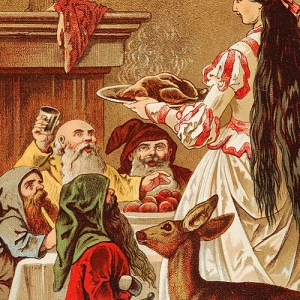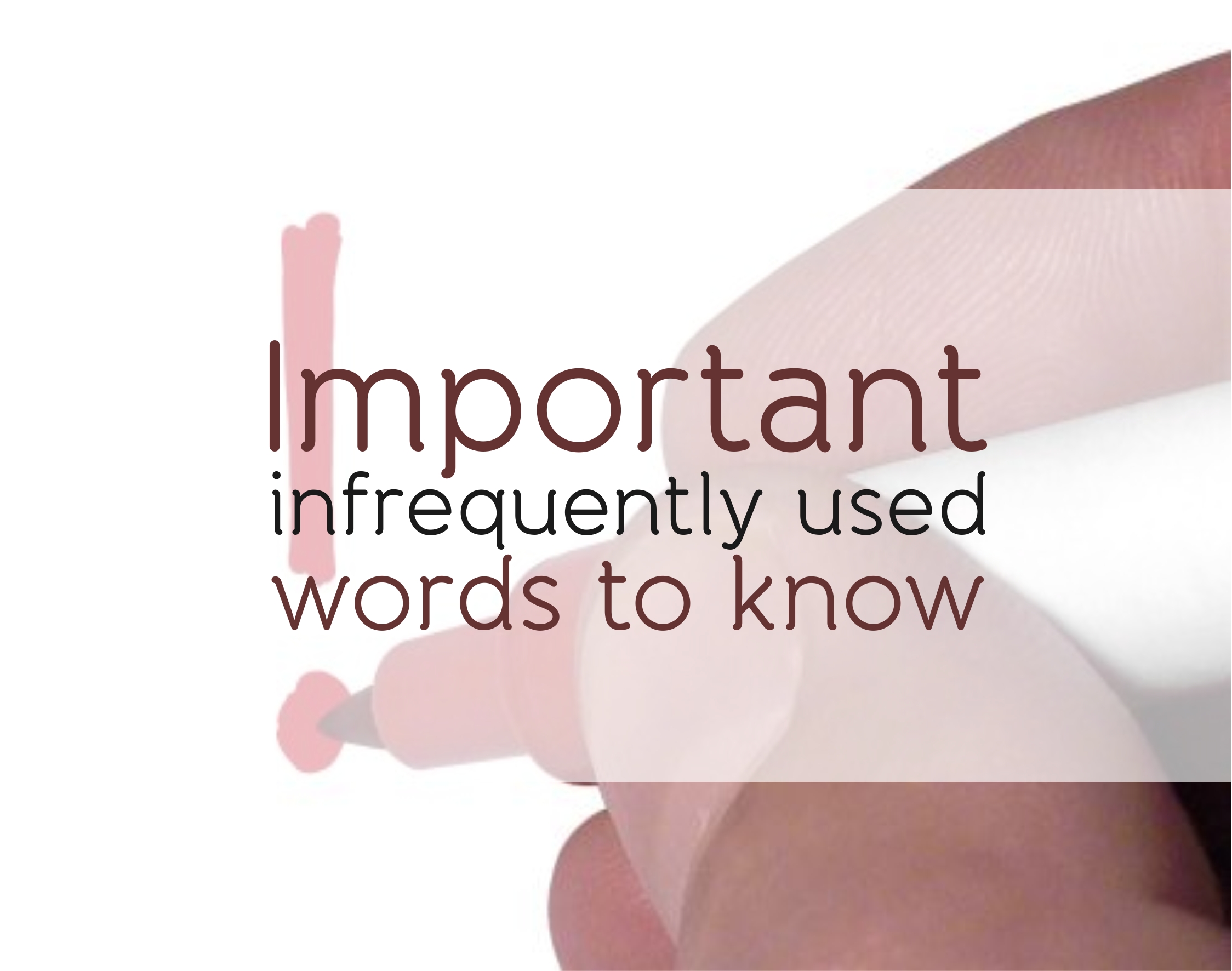The Politically Incorrect Etymologies of 10 Words and Phrases
At various moments in its life, a word will hop languages, change meanings, travel through sinister moments and land in pleasant ones. But no matter how many times it’s superimposed, and how far it gets from its original source, a word doesn’t let go of its memories easily. Here are 11 modern English words with socially insensitive origins.
1. Hysteria (n.) – a wild, irrational eruption of fear or emotion
Hysteria begins in the womb, or so thought the medical scholars of the 1610s, who named the condition after the Latin hystericus, meaning “of the womb.” Those who’ve studied the Victorian era, or read The Awakening in high school, may know that the go-to prognosis of the time for just about every female’s symptom from the occasional hissy fit to chronic seizures was a pesky wayfaring uterus. The condition was thought to be caused by sexual frustration and cured by intercourse or pelvic massage, the latter often performed by physicians and midwives. When doctors finally got fed up with the tedious task in the late 19th century, the personal vibrator was created to take their place. Read More…
14 Words That Are Their Own Opposites

Here’s an ambiguous sentence for you: “Because of the agency’s oversight, the corporation’s behavior was sanctioned.” Does that mean, ‘Because the agency oversaw the company’s behavior, they imposed a penalty for some transgression‘ or does it mean, ‘Because the agency was inattentive, they overlooked the misbehavior and gave it their approval by default’? We’ve stumbled into the looking-glass world of “contronyms”—words that are their own antonyms.
1. Sanction (via French, from Latin sanctio(n-), from sancire ‘ratify,’) can mean ‘give official permission or approval for (an action)’ or conversely, ‘impose a penalty on.’
*
2. Oversight is the noun form of two verbs with contrary meanings, “oversee” and “overlook.” “Oversee,” from Old English ofersēon ‘look at from above,’ means ‘supervise’ (medieval Latin for the same thing: super- ‘over’ + videre ‘to see.’) “Overlook” usually means the opposite: ‘to fail to see or observe; to pass over without noticing; to disregard, ignore.’
*
3. Left can mean either remaining or departed. If the gentlemen have withdrawn to the drawing room for after-dinner cigars, who’s left? (The gentlemen have left and the ladies are left.)
*
4. Dust, along with the next two words, is a noun turned into a verb meaning either to add or to remove the thing in question. Only the context will tell you which it is. When you dust are you applying dust or removing it? It depends whether you’re dusting the crops or the furniture.
*
5. Seed can also go either way. If you seed the lawn you add seeds, but if you seed a tomato you remove them.
*
6. Stone is another verb to use with caution. You can stone some peaches, but please don’t stone your neighbor (even if he says he likes to get stoned).
*
7. Trim as a verb predates the noun, but it can also mean either adding or taking away. Arising from an Old English word meaning ‘to make firm or strong; to settle, arrange,’ “trim” came to mean ‘to prepare, make ready.’ Depending on who or what was being readied, it could mean either of two contradictory things: ‘to decorate something with ribbons, laces, or the like to give it a finished appearance’ or ‘to cut off the outgrowths or irregularities of.’ And the context doesn’t always make it clear. If you’re trimming the tree are you using tinsel or a chain saw?
*
8. Cleave can be cleaved into two “homographs,” words with different origins that end up spelled the same. “Cleave,” meaning ‘to cling to or adhere,’ comes from an Old English word that took the forms cleofian, clifian, or clīfan. “Cleave,” with the contrary meaning ‘to split or sever (something), ‘ as you might do with a cleaver, comes from a different Old English word, clēofan. The past participle has taken various forms: “cloven,” which survives in the phrase “cloven hoof,” “cleft,” as in a “cleft palate” or “cleaved.”
*
9. Resign works as a contronym in writing. This time we have homographs, but not homophones. “Resign,” meaning ‘to quit,’ is spelled the same as “resign,” meaning ‘to sign up again,’ but it’s pronounced differently.
*
10. Fast can mean “moving rapidly,” as in “running fast,” or ‘fixed, unmoving,’ as in “holding fast.” If colors are fast they will not run. The meaning ‘firm, steadfast’ came first. The adverb took on the sense ‘strongly, vigorously,’ which evolved into ‘quickly,’ a meaning that spread to the adjective.
*
11. Off means ‘deactivated,’ as in “to turn off,” but also ‘activated,’ as in “The alarm went off.”
*
12. Weather can mean ‘to withstand or come safely through,’ as in “The company weathered the recession,” or it can mean ‘to be worn away’: “The rock was weathered.”
*
13. Screen can mean ‘to show’ (a movie) or ‘to hide’ (an unsightly view).
*
14. Help means ‘assist,’ unless you can’t help doing something, when it means ‘prevent.’
Read more: Contronyms: What did you mean by ‘deceptievly’ smart?
The 100 Most Beautiful Words in English

| Ailurophile | A cat-lover. |
| Assemblage | A gathering. |
| Becoming | Attractive. |
| Beleaguer | To exhaust with attacks. |
| Brood | To think alone. |
| Bucolic | In a lovely rural setting. |
| Bungalow | A small, cozy cottage. |
| Chatoyant | Like a cat’s eye. |
| Comely | Attractive. |
| Conflate | To blend together. |
| Cynosure | A focal point of admiration. |
| Dalliance | A brief love affair. |
| Demesne | Dominion, territory. |
| Demure | Shy and reserved. |
| Denouement | The resolution of a mystery. |
| Desuetude | Disuse. |
| Desultory | Slow, sluggish. |
| Diaphanous | Filmy. |
| Dissemble | Deceive. |
| Dulcet | Sweet, sugary. |
| Ebullience | Bubbling enthusiasm. |
| Effervescent | Bubbly. |
| Efflorescence | Flowering, blooming. |
| Elision | Dropping a sound or syllable in a word. |
| Elixir | A good potion. |
| Eloquence | Beauty and persuasion in speech. |
| Embrocation | Rubbing on a lotion. |
| Emollient | A softener. |
| Ephemeral | Short-lived. |
| Epiphany | A sudden revelation. |
| Erstwhile | At one time, for a time. |
| Ethereal | Gaseous, invisible but detectable. |
| Evanescent | Vanishing quickly, lasting a very short time. |
| Evocative | Suggestive. |
| Fetching | Pretty. |
| Felicity | Pleasantness. |
| Forbearance | Withholding response to provocation. |
| Fugacious | Fleeting. |
| Furtive | Shifty, sneaky. |
| Gambol | To skip or leap about joyfully. |
| Glamour | Beauty. |
| Gossamer | The finest piece of thread, a spider’s silk |
| Halcyon | Happy, sunny, care-free. |
| Harbinger | Messenger with news of the future. |
| Imbrication | Overlapping and forming a regular pattern. |
| Imbroglio | An altercation or complicated situation. |
| Imbue | To infuse, instill. |
| Incipient | Beginning, in an early stage. |
| Ineffable | Unutterable, inexpressible. |
| Ingénue | A naïve young woman. |
| Inglenook | A cozy nook by the hearth. |
| Insouciance | Blithe nonchalance. |
| Inure | To become jaded. |
| Labyrinthine | Twisting and turning. |
| Lagniappe | A special kind of gift. |
| Lagoon | A small gulf or inlet. |
| Languor | Listlessness, inactivity. |
| Lassitude | Weariness, listlessness. |
| Leisure | Free time. |
| Lilt | To move musically or lively. |
| Lissome | Slender and graceful. |
| Lithe | Slender and flexible. |
| Love | Deep affection. |
| Mellifluous | Sweet sounding. |
| Moiety | One of two equal parts. |
| Mondegreen | A slip of the ear. |
| Murmurous | Murmuring. |
| Nemesis | An unconquerable archenemy. |
| Offing | The sea between the horizon and the offshore. |
| Onomatopoeia | A word that sounds like its meaning. |
| Opulent | Lush, luxuriant. |
| Palimpsest | A manuscript written over earlier ones. |
| Panacea | A solution for all problems |
| Panoply | A complete set. |
| Pastiche | An art work combining materials from various sources. |
| Penumbra | A half-shadow. |
| Petrichor | The smell of earth after rain. |
| Plethora | A large quantity. |
| Propinquity | An inclination. |
| Pyrrhic | Successful with heavy losses. |
| Quintessential | Most essential. |
| Ratatouille | A spicy French stew. |
| Ravel | To knit or unknit. |
| Redolent | Fragrant. |
| Riparian | By the bank of a stream. |
| Ripple | A very small wave. |
| Scintilla | A spark or very small thing. |
| Sempiternal | Eternal. |
| Seraglio | Rich, luxurious oriental palace or harem. |
| Serendipity | Finding something nice while looking for something else. |
| Summery | Light, delicate or warm and sunny. |
| Sumptuous | Lush, luxurious. |
| Surreptitious | Secretive, sneaky. |
| Susquehanna | A river in Pennsylvania. |
| Susurrous | Whispering, hissing. |
| Talisman | A good luck charm. |
| Tintinnabulation | Tinkling. |
| Umbrella | Protection from sun or rain. |
| Untoward | Unseemly, inappropriate. |
| Vestigial | In trace amounts. |
| Wafture | Waving. |
| Wherewithal | The means. |
| Woebegone | Sorrowful, downcast. |
The 100 Funniest Words in English

| Abibliophobia | The fear of running out of reading material. |
| Absquatulate | To leave or abscond with something. |
| Allegator | Some who alleges. |
| Anencephalous | Lacking a brain. |
| Argle-bargle | A loud row or quarrel. |
| Batrachomyomachy | Making a mountain out of a molehill. |
| Billingsgate | Loud, raucous profanity. |
| Bloviate | To speak pompously or brag. |
| Blunderbuss | A gun with a flared muzzle or disorganized activity. |
| Borborygm | A rumbling of the stomach. |
| Boustrophedon | A back and forth pattern. |
| Bowyang | A strap that holds the pants legs in place. |
| Brouhaha | An uproar. |
| Bumbershoot | An umbrella. |
| Callipygian | Having an attractive rear end or nice buns. |
| Canoodle | To hug and kiss. |
| Cantankerous | Testy, grumpy. |
| Catercornered | Diagonal(ly). |
| Cockalorum | A small, haughty man. |
| Cockamamie | Absurd, outlandish. |
| Codswallop | Nonsense, balderdash. |
| Collop | A slice of meat or fold of flab. |
| Collywobbles | Butterflies in the stomach. |
| Comeuppance | Just reward, just deserts. |
| Crapulence | Discomfort from eating or drinking too much. |
| Crudivore | An eater of raw food. |
| Discombobulate | To confuse. |
| Donnybrook | An melee, a riot. |
| Doozy | Something really great. |
| Dudgeon | A bad mood, a huff. |
| Ecdysiast | An exotic dancer, a stripper. |
| Eructation | A burp, belch. |
| Fard | Face-paint, makeup. |
| Fartlek | An athletic training regime. |
| Fatuous | Unconsciously foolish. |
| Filibuster | Refusal to give up the floor in a debate to prevent a vote. |
| Firkin | A quarter barrel or small cask. |
| Flibbertigibbet | Nonsense, balderdash. |
| Flummox | To exasperate. |
| Folderol | Nonsense. |
| Formication | The sense of ants crawling on your skin. |
| Fuddy-duddy | An old-fashioned, mild-mannered person. |
| Furbelow | A fringe or ruffle. |
| Furphy | A portable water-container. |
| Gaberlunzie | A wandering beggar. |
| Gardyloo! | A warning shouted before throwing water from above. |
| Gastromancy | Telling fortune from the rumblings of the stomach. |
| Gazump | To buy something already promised to someone else. |
| Gobbledygook | Nonsense, balderdash. |
| Gobemouche | A highly gullible person. |
| Godwottery | Nonsense, balderdash. |
| Gongoozle | To stare at, kibitz. |
| Gonzo | Far-out journalism. |
| Goombah | An older friend who protects you. |
| Hemidemisemiquaver | A musical timing of 1/64. |
| Hobbledehoy | An awkward or ill-mannered young boy. |
| Hocus-pocus | Deceitful sleight of hand. |
| Hoosegow | A jail or prison. |
| Hootenanny | A country or folk music get-together. |
| Jackanapes | A rapscallion, hooligan. |
| Kerfuffle | Nonsense, balderdash. |
| Klutz | An awkward, stupid person. |
| La-di-da | An interjection indicating that something is pretentious. |
| Lagopodous | Like a rabbit’s foot. |
| Lickety-split | As fast as possible. |
| Lickspittle | A servile person, a toady. |
| Logorrhea | Loquaciousness, talkativeness. |
| Lollygag | To move slowly, fall behind. |
| Malarkey | Nonsense, balderdash. |
| Maverick | A loner, someone outside the box. |
| Mollycoddle | To treat too leniently. |
| Mugwump | An independent politician who does not follow any party. |
| Mumpsimus | An outdated and unreasonable position on an issue. |
| Namby-pamby | Weak, with no backbone. |
| Nincompoop | A foolish person. |
| Oocephalus | An egghead. |
| Ornery | Mean, nasty, grumpy. |
| Pandiculation | A full body stretch. |
| Panjandrum | Someone who thinks himself high and mighty. |
| Pettifogger | A person who tries to befuddle others with his speech. |
| Pratfall | A fall on one’s rear. |
| Quean | A disreputable woman. |
| Rambunctious | Aggressive, hard to control. |
| Ranivorous | Frog-eating |
| Rigmarole | Nonsense, unnecessary complexity. |
| Shenanigan | A prank, mischief. |
| Sialoquent | Spitting while speaking. |
| Skedaddle | To hurry somewhere. |
| Skullduggery | No good, underhanded dealing. |
| Slangwhanger | A loud abusive speaker or obnoxious writer. |
| Smellfungus | A perpetual pessimist. |
| Snickersnee | A long knife. |
| Snollygoster | A person who can’t be trusted. |
| Snool | A servile person. |
| Tatterdemalion | A child in rags. |
| Troglodyte | Someone or something that lives in a cave. |
| Turdiform | Having the form of a lark. |
| Unremacadamized | Having not been repaved with macadam. |
| Vomitory | An exit or outlet. |
| Wabbit | Exhausted, tired, worn out. |
| Widdershins | In a contrary or counterclockwise direction. |
| Yahoo | A rube, a country bumpkin. |
| @ | The “at” sign. |
8 Tantalizing Terms for Eating
Gobble
[gob–uhl]
 There are many different ways to partake in a meal: if your appetite is slight, then you might peck and nibble, but if you’re famished, you’re more likely to gobble. This word, which means both “to eat hastily” and “to make the throaty cry of a male turkey,” is thought to be a formation from the word gob, which is slang for mouth. Both definitions could be fun to try out at the dinner table.
There are many different ways to partake in a meal: if your appetite is slight, then you might peck and nibble, but if you’re famished, you’re more likely to gobble. This word, which means both “to eat hastily” and “to make the throaty cry of a male turkey,” is thought to be a formation from the word gob, which is slang for mouth. Both definitions could be fun to try out at the dinner table.Devour
[dih-vou–uhr, –vou-er]
 Another term for the ravenous, the word devour conjures a beastly manner of eating. The word is often invoked to express a degree of barbarous consumption, as in this passage from Robinson Crusoe about men so hungry they’d lost command of themselves: “The poor Creatures rather devour’d than eat it.”
Another term for the ravenous, the word devour conjures a beastly manner of eating. The word is often invoked to express a degree of barbarous consumption, as in this passage from Robinson Crusoe about men so hungry they’d lost command of themselves: “The poor Creatures rather devour’d than eat it.”Scarf
[skahrf]
 More than a festive fashion accessory, scarf can also mean “to eat, especially voraciously“. It’s often paired with a helping word, such as up or down, and implies a rapid or frenzied feeding. Those who scarf up their meals are often the first ones at the table to finish, and, as a result, the first ones to nap.
More than a festive fashion accessory, scarf can also mean “to eat, especially voraciously“. It’s often paired with a helping word, such as up or down, and implies a rapid or frenzied feeding. Those who scarf up their meals are often the first ones at the table to finish, and, as a result, the first ones to nap.Grub
[gruhb]
 One of the more versatile words on this list when it comes to discussing cuisine, grub can be used to refer to food itself, to the supplying of food, and to the eating of food. Needless to say, it’s a handy word to have in your back pocket at a family meal. But beware: in its noun form, this wily word can also mean “a dull, plodding person“, or the “sluggish larva, as of a scarab beetle“. Use this term wisely at the dinner table.
One of the more versatile words on this list when it comes to discussing cuisine, grub can be used to refer to food itself, to the supplying of food, and to the eating of food. Needless to say, it’s a handy word to have in your back pocket at a family meal. But beware: in its noun form, this wily word can also mean “a dull, plodding person“, or the “sluggish larva, as of a scarab beetle“. Use this term wisely at the dinner table.Chow Down
[chou]
 Associated more with meals of substance than snacks, the phrase chow down incorporates the word chow, which was perhaps brought to us from the Chinese pidgin English word chow-chow meaning “food.”
Associated more with meals of substance than snacks, the phrase chow down incorporates the word chow, which was perhaps brought to us from the Chinese pidgin English word chow-chow meaning “food.”Gorge
[gawrj]
 This word, which comes to us from the Old French verb gorger, means both “to eat greedily” and “to stuff with food.” In its noun form, gorge can refer to a gluttonous meal or the throat. So remember: the next time you gorge on a gorge, be sure to wash it down with water; we wouldn’t want anything to get stuck in your gorge.
This word, which comes to us from the Old French verb gorger, means both “to eat greedily” and “to stuff with food.” In its noun form, gorge can refer to a gluttonous meal or the throat. So remember: the next time you gorge on a gorge, be sure to wash it down with water; we wouldn’t want anything to get stuck in your gorge.Nosh
[nosh]
 Unlike devour and gorge, this word for eating implies a lighter and more casual consumption. Nosh means “to snack or eat between meals” or “to snack on.” It came to English from the Yiddish nashn meaning “to nibble”.
Unlike devour and gorge, this word for eating implies a lighter and more casual consumption. Nosh means “to snack or eat between meals” or “to snack on.” It came to English from the Yiddish nashn meaning “to nibble”.Gormandize
[v. gawr-muhn-dahyz]
 Those who gormandize at the dining table eat in a particularly greedy or ravenous manner. The word comes to us from the Middle French gourmand, meaning “glutton.” In English, the noun gourmand has the slightly less pejorative sense of “a person who is fond of good eating, often indiscriminately and to excess.”
Those who gormandize at the dining table eat in a particularly greedy or ravenous manner. The word comes to us from the Middle French gourmand, meaning “glutton.” In English, the noun gourmand has the slightly less pejorative sense of “a person who is fond of good eating, often indiscriminately and to excess.”SOURCE
Simple but Intelligent Word Choices
#10: Lucid
#9: Austere
#8: Volatile
#7: Stoic
#6: Caustic
#5: Maudlin
#4: Lurid
#3: Glib
#2: Cavalier
#1: Demure
Read more…
18 Common Words That You Should Replace in Your Writing

It’s a familiar scene: you’re slumped over your keyboard or notebook, obsessing over your character. While we tend to agonize over everything from structure to backstory, it’s important to weigh how you write something too. A perfectly constructed world is flat on the page if you use feeble, common words. When you’re finished constructing your perfectly balanced world, do your writing a favor and take another pass to weed out these 18 haggard words.
Good
High on any list of most used English words is “good.” While this word may appear to be the perfect adjective for nearly anything, that is precisely what makes it so vague. Try getting more specific. If something’s going well, try “superb,” “outstanding” or “exceptional.”
New
Another of the common words in English is “new.” “New” is an adjective that doesn’t always set off alarm bells, so it can be easy to forget about. Give your writing more punch by ditching “new” and using something like “latest” or “recent” instead.
Long
Much like “new,” “long” is spent, yet it doesn’t always register as such while you’re writing. Instead of this cliché phrase, try describing exactly how long it is: “extended,” “lingering” or “endless,” for example.
Old
“Old” is certainly one of those common words that means more to readers if you’re specific about how old a subject is. Is it “ancient,” “fossilized,” “decaying” or “decrepit”?
Right
“Right” is also among the common words that tends to slip through our writer filters. If somebody is correct, you could also say “exact” or “precise.” Don’t let habit words like “right” dampen your writing.
Different
Here’s another adjective that falls a bit flat for readers, but can also easily be improved by getting more specific. Saying something is “odd” or “uncommon” is very different than saying it is “exotic” or “striking.”
Small
“Small” is another adjective that is too generic for writing as good as yours. Use “microscopic,” “miniature” or “tiny” instead. Even using “cramped” or “compact” is more descriptive for your audience.
Large
Just like relying too much on “small,” we tend to describe large things as, well, “large.” Specificity is a big help with this one too: could your subject be “substantial,” “immense,” “enormous” or “massive”?
Next
Whenever we describe something coming “next,” we run the risk of losing our readers. Good options to make your reading more powerful include “upcoming,” “following” or “closer.”
Young
Another case of being too generic is what makes “young” a problematic adjective. If you want your writing to be more captivating, try switching “young” out for “youthful,” “naive” or “budding.”
Never
“Never” is also among common words to use sparingly. Not only is it a common, stale descriptor, it’s also usually incorrect. For something to never happen, even one instance makes this word inaccurate. Try “rarely,” “scarcely” or “occasionally” instead.
Things
“Things” is another repeat offender when it comes to worn out words. Another word where specificity is the key, try replacing “things” with “belongings,” “property” or “tools.”
All
Just like “never,” “all” is an encompassing, absolute term. Not only is “all” unoriginal, it’s not usually factual. Try using “each” and “copious” instead.
Feel
“Feel” is also in the company of common English words. Try using “sense,” or “discern” instead. You can also move your sentence into a more active tense: “I feel hungry” could become “I’m famished,” for example.
Seem
“Seem” is bad habit word we are all guilty of using. Regardless of how well you think your sentence is constructed, try switching “seem” out for “shows signs of.” “Comes across as” is another good option to give your writing more power.
Almost
Another easy adjective to let slip by, “almost” is a wasted opportunity to engage your readers. “Almost” is more interesting if you say “practically,” “nearly” or “verging on” instead.
Just
“Just making” it or “just barely” affording something isn’t very descriptive. To truly grab a reader, we must do better. Try “narrowly,” “simply” or “hardly” to give your phrasing more weight.
Went
Last but not least, avoid using the common word “went” to describe your subject. “Went” is a word that lacks traction. Try using “chose,” “decided on” or “rambled” to truly grab your readers.






























